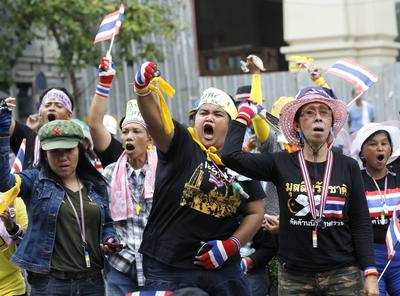of the red-shirt faction, which has traditionally supported the government. The bill provides amnesty to all those involved in politically-related crimes committed between 2004 and August 2013. This means that Thaksin Shinawatra would be free of corruption charges, but possibly also from prosecution for alleged human rights abuses dating from his government’s war on drugs and the campaign against unrest in southern Thailand. In a similar vein, Abhisit Vejjajiva, leader of the opposition Democrat Party, could no longer be investigated for directing the violent suppression of red-shirt protesters in 2010. The only people who would not be eligible for amnesty are those facing lèse-majesté charges.
The amnesty bill offers profuse evidence of collective action dynamics both inside and outside parliament. Within parliament, every single member of the Democrat Party who stayed up for this marathon 19-hour parliamentary session walked out of the room instead of voting against the bill. But not a single member of the Pheu Thai Party dared to vote against it, even though many owe their seats to the efforts of the red-shirt protesters. Only four Pheu Thai MPs, including one whose father was assassinated in front of international news reporters during the 2010 protests, refrained from voting. Rarely has the Thai parliament acted so unanimously toward a piece of legislation.
Hundreds of people gathered in key districts of Bangkok to demonstrate their opposition to the legislation. The yellow-shirt group does not want Thaksin back in the country, let alone with a clean slate. The red-shirt camp is deeply affronted by the government’s willingness to forget the lives sacrificed by their supporters. Those not allied with either camp believe the bill threatens the national legal system and fear that it sets a precedent for future abuses of power. But while the political parties may be expected to stick with their collective decisions on whether to support the legislation, this will not be as easy for protesters on the street. As the demonstrations continue, it has become increasingly clear that not everyone shares the same objective. The yellow shirts soon escalated their protest against the bill into an attempt to overthrow the government. But it is difficult for the red shirts to support the removal of a government they elected. Opposition to the amnesty bill, originally a common cause adopted by a wide spectrum of political interests, is now waning as these divergent objectives reassert themselves. Both the red and yellow shirts are drifting away from their common goal — defeating the bill — but for different reasons.
Subsequently, on 11 November, the Senate unanimously rejected the bill by a vote of 141 to 0. According to the constitution, the legislation may only be reintroduced after 180 days. The House of Representatives then has the power to automatically pass the bill in the name of the whole parliament by majority vote. Past experience suggests that Prime Minister Yingluck Shinawatra is likely to wield her influence over the House of Representatives and proceed with the bill for her brother’s sake, although she has promised not to do so. But the fact that her party still dominates the House of Representatives (and given that Yingluck’s four-year term will come to an end in 2015) indicates that she might try to revive the bill and then dissolve the parliament in mid-2014 — a strategy used too often by previous prime ministers when encountering difficult political situations.
However, if the Pheu Thai government is to remain in power, it needs the support of the red-shirt camp. It cannot afford to continue pushing through the amnesty bill because the controversial proposal is dividing the red-shirt movement between those who side with Thaksin no matter what, and those whose support does not extend to letting the murder of their friends go unpunished. This dilemma will likely delay concrete collective action by the red-shirt group so long as its members are unable to agree on a common position. This contrasts with the position of the yellow-shirt faction, which is united by a desire to expunge Thaksin’s influence from Thai politics and thus has the stronger position when it comes to taking action. In addition, the red-shirt group comprises a larger and more diverse membership than the yellow shirts. Uncertainty over the future of the amnesty bill has once again brought Thai politics to the brink of violent confrontation involving clashes between the government and the people and among the different interest groups in Thai society.
Boonwara Sumano is a PhD candidate at Queen Mary, University of London.

